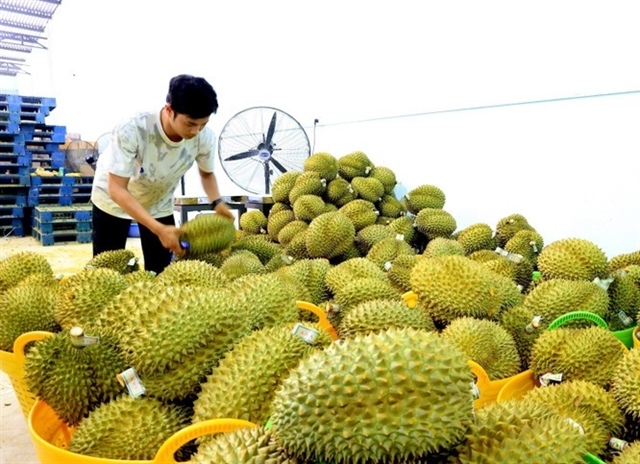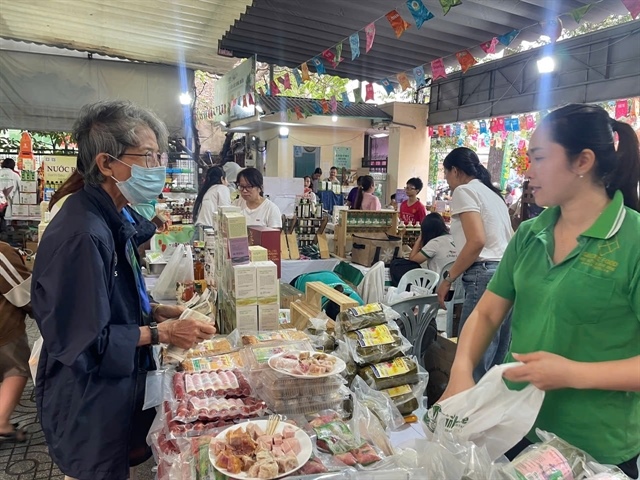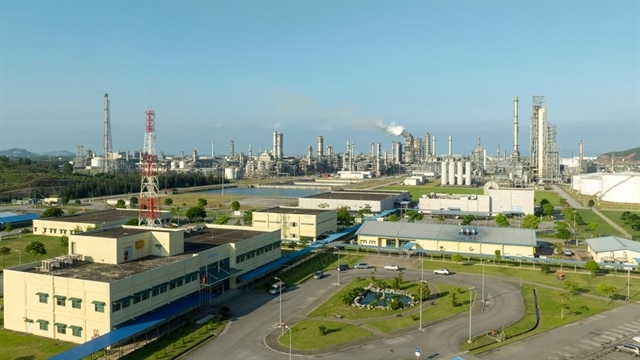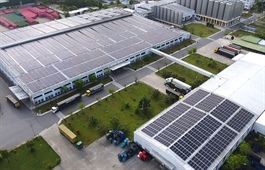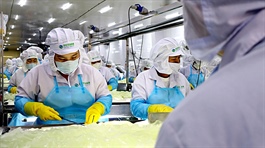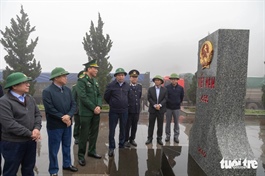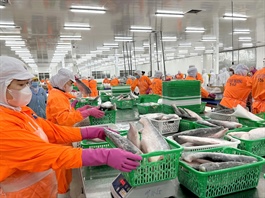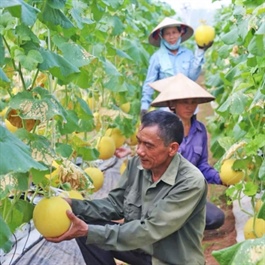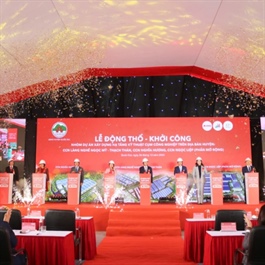Hanoi supports farmers' end-of-year agricultural sales
Hanoi supports farmers' end-of-year agricultural sales
The city has improved market forecasting and supported the sale of clean and organic agricultural products.
With the Lunar New Year - the peak harvest season for many agricultural products - approaching in about a month, farmers and cooperatives are in urgent need of sales support, and Hanoi is stepping up efforts to get farm produce into modern distribution channels.
Nguyen Thi Thu Hang, Director of the Hanoi Sub-Department of Agro-Forestry and Fisheries Quality Management, spoke to Hanoimoi Newspaper about initiatives to expand export markets and add value to safe agricultural products in the city.
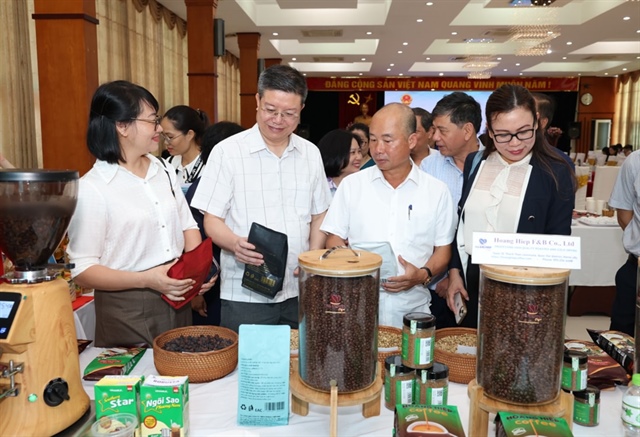
Nguyen Thi Thu Hang, Director of the Hanoi Agro-Forestry and Fisheries Quality Management Sub-Department of the Hanoi Department of Agriculture and Rural Development. Photos: Hanoimoi Newspaper |
What is Hanoi's current demand and supply of key agricultural, forestry and fisheries products?
With a population of around 10 million and millions of domestic and international tourists each year, Hanoi has a significant demand for agricultural products.
The city needs about 99,450 tons of rice, 19,890 tons of pork, 6,630 tons of poultry, 5,520 tons of fresh and frozen seafood, 5,520 tons of processed food, 110,500 tons of vegetables, and 132 million eggs per month.
The city's agricultural production can largely meet its needs for pork, poultry, eggs, and freshwater fish. The rest is sourced from various provinces and cities and imported through distribution channels, supermarkets, and local businesses.
How do the distribution channels work during peak season and year-end?
The city currently has a vast distribution network with 29 shopping malls, 130 supermarkets and 455 wet markets, including two agricultural wholesale markets (Southern Wholesale Market in Hoang Mai District and Minh Khai Wholesale Market in Bac Tu Liem District) and five key markets (Long Bien Market, Yen So Fish Market, Ha Vy Market). In addition, there are 2,000 convenience stores and tens of thousands of grocery outlets, as well as over 400 e-commerce platforms and multi-channel sales channels via smartphones, websites and shopping apps.
In traditional markets, traders procure from farmers and sell at wholesale and major markets. From there, agricultural products are distributed to local markets, retail stores, and canteens.
Agricultural products could also be distributed through production-consumption chains, with farmers selling directly to certified safe food retail systems.
What What key activities and events have been organized to promote agricultural trade in Hanoi in 2024, and what are the outcomes?
In 2024, Hanoi's Departments of Agriculture and Rural Development, Industry and Trade, and the city's Promotion Agency have held more than 50 trade-related events, including conferences, forums, fairs, festivals, and product exhibitions showcasing agricultural, forestry, and aquatic products from various provinces.
In particular, the city hosted the 2024 Spring Festival of Peach Blossoms, Kumquat Trees, and OCOP Products from various regions, covering an area of about 7,000 square meters with 100 booths. In addition, the 2024 Craft Village and Safe Agricultural Products Fair was held in Thanh Oai District, with more than 1,000 products from various districts and 22 provinces, attracting thousands of visitors.
Hanoi also organized a promotional week for OCOP products and safe food, as well as an exhibition of safe farm produce from Hanoi and other provinces, with 50 booths from 150 enterprises and cooperatives across 45 provinces.
These events showcased more than 1,000 key agricultural commodities and attracted more than 10,000 visitors. Hanoi also convened a conference to promote agricultural exports to China and facilitate direct links between local enterprises and cooperatives from provinces such as Tuyen Quang, Nam Dinh, Nghe An, Lam Dong, and Ninh Binh.
The city also sent delegations to trade shows in Australia and Sweden to seek international partners and expand the global market for Hanoi's safe agricultural products.
In the first 11 months of 2024, Hanoi's farm exports reached $2 billion, with food products alone accounting for $1.3 billion, up 34.9% from the same period in 2023, according to the Hanoi Statistics Office.
In addition to improving connections and promoting agricultural consumption, Hanoi is actively supporting farmers in production. The city has adopted market forecasting solutions and support for the sale of agricultural products, especially clean and organic goods.
How does Hanoi support its farmers and improve the quality and safety of its agricultural products?
The Hanoi Department of Agriculture and Rural Development has taken measures to push forward high-tech agriculture and digital transformation. As a result, the city now has 406 high-tech agricultural models, accounting for about 40% of the total agricultural production value.
Hanoi has developed more safe agricultural production-consumption chains, with 170 networks established. The city has created a geographical indication for La Tinh grapefruit in Hoai Duc and over 100 collective trademarks as well as certified protected agricultural and aquatic products.
We encourage safe agricultural supply chains to participate in the Hanoi Food Traceability System, which can be accessed at https://check.hanoi.gov.vn.
The city is home to 11,510 enterprises involved in the production, processing, and trade of agricultural, forestry, and aquatic products, including more than 1,700 processing enterprises with diverse offerings.
Recent initiatives have focused on assisting and guiding these facilities in applying high-tech solutions and advanced quality management programs to their processes to improve food safety and add value to processed products.
Currently, 72% of facilities have automated or semi-automated production processes - an increase of 12% since 2020 - while 27% of processing facilities have adopted management programs such as GMP, ISO 22000 and HACCP, an increase of more than 17% over the same period.
What strategies does Hanoi have in place to expand the market for safe agricultural products, both domestically and for export?
Hanoi is actively focusing on expanding the market for safe agricultural products through links with supermarkets and canteens, as well as establishing distribution networks in various provinces.
The Hanoi Department of Agriculture and Rural Development works with local sectors to provide timely updates on market trends for domestic and international agricultural products. This includes information on import demand and key export markets, allowing farmers to tailor their production to market needs.
The city is increasing its support for farmers by providing guidance on production and consumption strategies, as well as assistance in creating and registering trademarks, food safety certifications, and collective brand designs at the national and international levels.
In addition, Hanoi is working with several provinces that are major suppliers of agricultural products to the city to facilitate direct links between farmers and local processing, trading, and distribution systems in order to create sustainable supply chains.
The city has also organized numerous conferences, workshops, and trade promotion events to showcase the supply chains of safe agricultural, forestry, and aquatic products from various provinces. Our collaboration with the city's Department of Industry and Trade and the city's Promotion Agency further strengthens the distribution of these products.
Thank you for your time!


